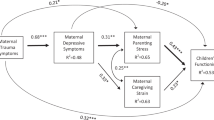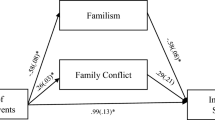Abstract
The intergenerational effects of trauma resulting from torture and war are complex and multi-faceted and have important implications for the family system. The current study aimed to identify key relationships between refugee maternal caregiver exposure to torture, mental health, and physical health with maternal-reported youth adjustment. Ninety-six Karen maternal caregivers originating from Burma and resettled in the United States participated in a cross-sectional, explanatory mixed methods study. Maternal mental health distress was found to mediate the relationship betweenmaternal torture experiences and youth adjustment, R2 = .357. Physical health problems was found to moderate the degree to which mental health distress mediated the relationship between torture and war trauma experiences and youth adjustment, R2 = .409. The current study is significant in that it enhances our mechanistic understanding of factors relevant to the intergenerational effects of trauma within families where maternal caregivers experienced trauma from torture and/or war.

Similar content being viewed by others
References
United Nations General Assembly. Convention against Torture and Other Cruel, Inhuman or Degrading Treatment or Punishment. 1984. https://www.ohchr.org/en/professionalinterest/pages/cat.aspx. Accessed 26 Dec 2019.
Higson-Smith C. Updating the estimate of refugees resettled in the United States who have suffered torture. Center for Victims of Torture. 2015. https://www.cvt.org/sites/default/files/SurvivorNumberMetaAnalysis_Sept2015_0.pdf. Accessed 26 Dec 2019.
Shishehgar S, Gholizadeh L, DiGiacomo M, Green A. Davidson PM. Health and socio-cultural experiences of refugee women: An integrative review. J Immigr Minor Health. 2016. pp 1–15
Sidebotham E, Moffatt J, Jones K. Sexual violence in conflict: a global epidemic. Obstet Gynaecol. 2016;18(4):247–50.
Sangalang CC, Vang C. Intergenerational trauma in refugee families: a systematic review. J Immigr Minor Health. 2017;19(3):745–55.
Wieling E. Family interventions for populations exposed to traumatic stress related to war and violence. J Marital Fam Ther. 2018;44(2):189–92.
Daud A, Skoglund E, Rydelius PA. Children in families of torture victims: transgenerational transmission of parents’ traumatic experiences to their children. Int J Soc Welf. 2005;14(1):23–322.
Dalgaard NT, Todd BK, Daniel SI, Montgomery E. The transmission of trauma in refugee families: associations between intra-family trauma communication style, children’s attachment security and psychosocial adjustment. Attach Hum Dev. 2016;18(1):69–89.
Daud A, af Klinteberg B, Rydelius PA. Resilience and vulnerability among refugee children of traumatized and non-traumatized parents. Child Adolesc Psychiatry Mental Health. 2008;2(1):7.
Montgomery E. Tortured families: a coordinated management of meaning analysis. Fam Process. 2004;43(3):349–71.
Sangalang CC, Jager J, Harachi TW. Effects of maternal traumatic distress on family functioning and child mental health: an examination of Southeast Asian refugee families in the US. Soc Sci Med. 2017;184:178–86.
Van Ee E, Kleber RJ, Mooren T. War trauma lingers on: Associations between maternal posttraumatic stress disorder, parent–child interaction, and child development. Infant Ment Health J. 2012;33(5):459–68.
Burchert S, Stammel N, Knaevelsrud C. Transgenerational trauma in a post-conflict setting: Effects on offspring PTSS/PTSD and offspring vulnerability in Cambodian families. Psychiatry Res. 2017;254:151–7.
East PL, Gahagan S, Al-Delaimy WK. The impact of refugee mothers’ trauma, posttraumatic stress, and depression on their children’s adjustment. J Immigr Minor Health. 2018;20(2):271–82.
United Nations General Assembly. Convention against Torture and Other Cruel, Inhuman or Degrading Treatment or Punishment. 1984. https://www.un.org/documents/ga/res/39/a39r046.htm
Office of Refugee Resettlement, Administration for Children and Families, & United States Department of Health and Human Services. 2010. Torture survivors program (TSP) eligibility determination guidance. https://www.acf.hhs.gov/sites/default/files/orr/eligibility_guidelines_orr_2010_1.pdf
American Psychiatric Association. Diagnostic and statistical manual of mental disorders (4th ed., text rev.). Washington, DC: Author. 2000.
Karen History. (2019). Retrieved from https://www.mnkaren.org/about/.
Hoffman SJ, Robertson CL. A systematic review of Karen refugee health. Int J Migr Health Soc Care. 2016;12(1):1–15.
Shannon PJ, Vinson GA, Wieling E, Cook T, Letts J. Torture, war trauma, and mental health symptoms of newly arrived Karen refugees. J Loss Trauma. 2015;20(6):577–90.
Hoffman SJ, Robertson CL, Tierney JD. What about the next generation that's coming? The recontextualization of mothering post-refugee resettlement. Adv Nurs Sci. 2017;40(2):122–53.
Brink DR, Shannon PJ, Vinson GA. Validation of a brief mental health screener for Karen refugees in primary care. Fam Pract. 2015;33(1):107–11.
Goodman R, Meltzer H, Bailey V. The Strengths and Difficulties Questionnaire: A pilot study on the validity of the self-report version. Eur Child Adolesc Psychiatry. 1998;7:125–30.
Shannon PJ, Vinson GA, Wieling E, Cook T, Letts J. Torture, war trauma, and mental health symptoms of newly arrived Karen refugees. Journal of Loss and Trauma. 2015;20(6):577–90.
Hayes AF: Introduction to mediation, moderation and conditional process analysis: A regression based approach (2 ed). 2018. https://processmacro.org/download.html. Accessed 26 Dec 2019
Hayes AF, Rockwood NJ. Regression-based statistical mediation and moderation analysis in clinical research: observations, recommendations, and implementation. Behav Res Ther. 2017;98:39–57.
R Core Team. R: A language and environment for statistical computing. Vienna, Austria: R Foundation for Statistical Computing. 2019. https://www.R-project.org/. Accessed 26 Dec 2019.
IBM Corp. IBM SPSS Statistics for Windows, Version 26.0. Armonk, NY: IBM Corp. 2019.
Fossion P, Leys C, Vandeleur C, Kempenaers C, Braun S, Verbanck P, Linkowski P. Transgenerational transmission of trauma in families of Holocaust survivors: the consequences of extreme family functioning on resilience, sense of coherence, anxiety and depression. J Affect Disord. 2015;171:48–53.
Danieli Y, Norris FH, Engdahl B. A question of who, not if: psychological disorders in Holocaust survivors’ children. Psychol Trauma. 2017;9(S1):98.
Shmotkin D, Shrira A, Goldberg SC, Palgi Y. Resilience and vulnerability among aging Holocaust survivors and their families: an intergenerational overview. J Intergener Relatsh. 2011;9(1):7–21.
Stauffer S. Trauma and disorganized attachment in refugee children: integrating theories and exploring treatment options. Refugee Surv Q. 2008;27(4):150–63.
Bek-Pedersen K, Montgomery E. Narratives of the past and present: young refugees’ construction of a family identity in exile. J Refug Stud. 2006;19(1):94–112.
Lazarevic V. Effects of cultural brokering on individual wellbeing and family dynamics among immigrant youth. J Adolesc. 2017;55:77–87.
Bauer E. Practicing kinship care: children as language brokers in migrant families. Childhood. 2016;23(1):22–36.
Pina LR, Gonzalez C, Nieto C, Roldan W, Onofre E, Yip JC. How Latino children in the us engage in collaborative online information problem solving with their families. Proc ACM Human-Comp Interaction. 2018;2(CSCW):140.
Chao X. ‘What defines me is what I have been through’: Bhutanese refugee youth identity in the United States. Br J Sociol Educ. 2019; p. 1–17.
Morales A, Wang KT. The relationship among language brokering, parent–child bonding, and mental health correlates among Latinx college students. J Ment Health Couns. 2018;40(4):316–32736.
Acknowledgements
We acknowledge the essential contributions in early project phases by the Center for Victims of Torture, headquartered in St. Paul, Minnesota. Specifically, we thank the Director of Research, Craig Higson Smith for his guidance and expertise. We thank the Karen Organization of Minnesota for key project support. We attribute the depth and richness of the data, in part, to our interpreter, Ehtaguy Zar.
Funding
Research reported in this publication was supported by the Eunice Kennedy Shriver National Institute of Child Health & Human Development of the National Institutes of Health under Award Number K12HD055887. The content is solely the responsibility of the authors and does not necessarily represent the official views of the National Institutes of Health.
Author information
Authors and Affiliations
Corresponding author
Ethics declarations
Conflict of interest
All authors have no conflict of interest to report.
Additional information
Publisher's Note
Springer Nature remains neutral with regard to jurisdictional claims in published maps and institutional affiliations.
Rights and permissions
About this article
Cite this article
Hoffman, S.J., Vukovich, M.M., Gewirtz, A.H. et al. Mechanisms Explaining the Relationship Between Maternal Torture Exposure and Youth Adjustment In Resettled Refugees: A Pilot Examination of Generational Trauma Through Moderated Mediation. J Immigrant Minority Health 22, 1232–1239 (2020). https://doi.org/10.1007/s10903-020-01052-z
Published:
Issue Date:
DOI: https://doi.org/10.1007/s10903-020-01052-z




